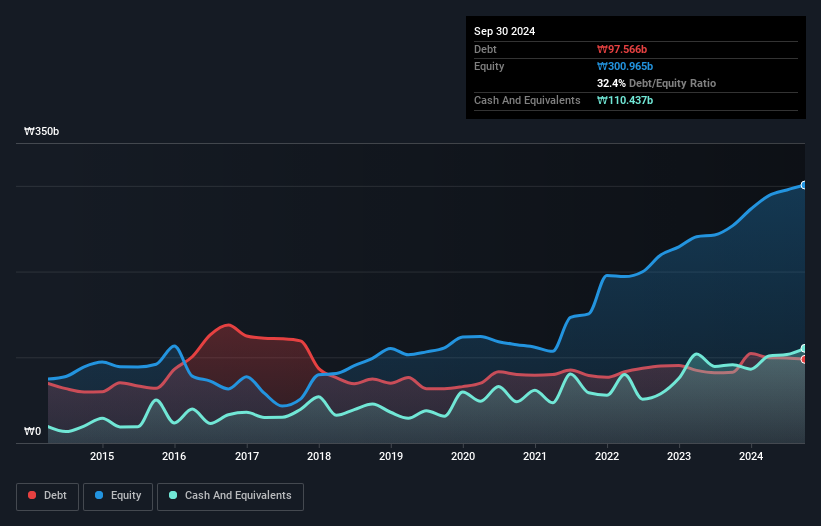- South Korea
- /
- Communications
- /
- KOSDAQ:A050890
SOLiD (KOSDAQ:050890) Could Easily Take On More Debt
Some say volatility, rather than debt, is the best way to think about risk as an investor, but Warren Buffett famously said that 'Volatility is far from synonymous with risk.' So it might be obvious that you need to consider debt, when you think about how risky any given stock is, because too much debt can sink a company. We note that SOLiD, Inc. (KOSDAQ:050890) does have debt on its balance sheet. But the more important question is: how much risk is that debt creating?
When Is Debt A Problem?
Debt and other liabilities become risky for a business when it cannot easily fulfill those obligations, either with free cash flow or by raising capital at an attractive price. In the worst case scenario, a company can go bankrupt if it cannot pay its creditors. However, a more common (but still painful) scenario is that it has to raise new equity capital at a low price, thus permanently diluting shareholders. By replacing dilution, though, debt can be an extremely good tool for businesses that need capital to invest in growth at high rates of return. The first step when considering a company's debt levels is to consider its cash and debt together.
View our latest analysis for SOLiD
How Much Debt Does SOLiD Carry?
The image below, which you can click on for greater detail, shows that at September 2024 SOLiD had debt of ₩97.6b, up from ₩82.6b in one year. However, it does have ₩110.4b in cash offsetting this, leading to net cash of ₩12.9b.

How Healthy Is SOLiD's Balance Sheet?
We can see from the most recent balance sheet that SOLiD had liabilities of ₩122.4b falling due within a year, and liabilities of ₩49.9b due beyond that. Offsetting these obligations, it had cash of ₩110.4b as well as receivables valued at ₩54.3b due within 12 months. So it has liabilities totalling ₩7.57b more than its cash and near-term receivables, combined.
This state of affairs indicates that SOLiD's balance sheet looks quite solid, as its total liabilities are just about equal to its liquid assets. So while it's hard to imagine that the ₩430.3b company is struggling for cash, we still think it's worth monitoring its balance sheet. Despite its noteworthy liabilities, SOLiD boasts net cash, so it's fair to say it does not have a heavy debt load!
The good news is that SOLiD has increased its EBIT by 6.9% over twelve months, which should ease any concerns about debt repayment. The balance sheet is clearly the area to focus on when you are analysing debt. But it is SOLiD's earnings that will influence how the balance sheet holds up in the future. So when considering debt, it's definitely worth looking at the earnings trend. Click here for an interactive snapshot.
But our final consideration is also important, because a company cannot pay debt with paper profits; it needs cold hard cash. SOLiD may have net cash on the balance sheet, but it is still interesting to look at how well the business converts its earnings before interest and tax (EBIT) to free cash flow, because that will influence both its need for, and its capacity to manage debt. Over the most recent three years, SOLiD recorded free cash flow worth 76% of its EBIT, which is around normal, given free cash flow excludes interest and tax. This free cash flow puts the company in a good position to pay down debt, when appropriate.
Summing Up
We could understand if investors are concerned about SOLiD's liabilities, but we can be reassured by the fact it has has net cash of ₩12.9b. And it impressed us with free cash flow of ₩54b, being 76% of its EBIT. So we don't think SOLiD's use of debt is risky. Over time, share prices tend to follow earnings per share, so if you're interested in SOLiD, you may well want to click here to check an interactive graph of its earnings per share history.
Of course, if you're the type of investor who prefers buying stocks without the burden of debt, then don't hesitate to discover our exclusive list of net cash growth stocks, today.
New: Manage All Your Stock Portfolios in One Place
We've created the ultimate portfolio companion for stock investors, and it's free.
• Connect an unlimited number of Portfolios and see your total in one currency
• Be alerted to new Warning Signs or Risks via email or mobile
• Track the Fair Value of your stocks
Have feedback on this article? Concerned about the content? Get in touch with us directly. Alternatively, email editorial-team (at) simplywallst.com.
This article by Simply Wall St is general in nature. We provide commentary based on historical data and analyst forecasts only using an unbiased methodology and our articles are not intended to be financial advice. It does not constitute a recommendation to buy or sell any stock, and does not take account of your objectives, or your financial situation. We aim to bring you long-term focused analysis driven by fundamental data. Note that our analysis may not factor in the latest price-sensitive company announcements or qualitative material. Simply Wall St has no position in any stocks mentioned.
About KOSDAQ:A050890
SOLiD
Develops, manufactures, and sells parts, products, and equipment for mobile and digital communication networks.
Flawless balance sheet and fair value.
Similar Companies
Market Insights
Weekly Picks


The Future of Social Sharing Is Private and People Are Ready


EU#3 - From Philips Management Buyout to Europe’s Biggest Company

Booking Holdings: Why Ground-Level Travel Trends Still Favor the Platform Giants


A fully integrated LNG business seems to be ignored by the market.
Recently Updated Narratives


Hims & Hers Health aims for three dimensional revenue expansion

DMCI Holdings will shine with a projected fair value of 68.43 in the next 5 years

Proximus: The State-Backed Backup Plan with 7% Gross Yield and 15% Currency Upside.
Popular Narratives

Undervalued Key Player in Magnets/Rare Earth


NVDA: Expanding AI Demand Will Drive Major Data Center Investments Through 2026


The "Easy Money" Is Gone: Why Alphabet Is Now a "Show Me" Story
Trending Discussion





